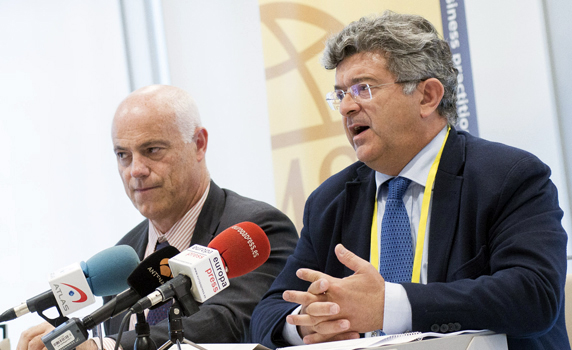
How can professional networks and ecosystems impact the design of new business models? Can they be leveraged to implement strategies in businesses? Or even to foster innovation and internationalization?
These were among the topics discussed at the 34th Annual International Conference of the Strategic Management Society (SMS), which was held recently in Madrid under the exclusive sponsorship of IESE. One of the year's most important academic events, the meeting attracted more than 1,100 researchers, executives and experts in strategic management.
This year’s theme was "Strategies in a World of Networks." Under the direction of the Professors Africa Ariño and Pascual Berrone, more than 100 special conferences were delivered addressing issues as diverse as the influence of networks on reputation, their impact on the sustainability and competitiveness of businesses, the challenges of government in global environments and the governance of multiple relationships deriving from the current business ecosystems.
Networks as a source of competitive advantage
Only a few decades ago change was being driven by the emergence of technology. Today’s shifts in business models are, more than ever, the result of certain networks or ecosystems. These changes challenge traditional ideas and are forcing managers and organizations to develop new success and survival strategies.
"The underlying premise of the conference is the concept of networks. Those who are better at managing these networks will be able to create and deliver greater value, which demonstrates that they are a potential source of competitive advantage," says Prof. Berrone.
New vision of strategy
The conference focused on significant changes in strategic management that are taking place. "Four or five years ago, we viewed strategy as resource based. Now we are shifting toward a more behavioral conception focused on the actors who will be making the decisions," says Africa Ariño.
Over the course of five days, delegates heard from a number of experts and keynotes speakers, including Paul Polman, CEO of Unilever, who was presented with a Lifetime Achievement Award for his commitment and contribution to the responsible enterprise.
Other popular keynotes were delivered by Martin Hirt, leader of global strategy for McKinsey Asia, and professors Henry Mintzberg of McGill University in Montreal and Ronald Burt of the University of Chicago Booth School of Business.
In tandem with the Madrid sessions, seven parallel events were held at key locations in Spain and France, including Paris, Marseille, San Sebastian and Toledo. IESE’s Barcelona campus hosted a conference on new approaches to strategy in family businesses, led by Prof. Roberto García-Castro. The Barcelona event attracted participation from faculty and PhD students.
Theory for action
A number of clear conceptual frameworks emerged from this year’s conference that will help reinforce business decisions.
"Companies must make an effort to discover and understand these theories that we outlined in the conference. They must then understand their own reality. And attempt to apply the theory to their particular business," added Berrone.
A key imperative for companies is to learn how to leverage their competitive position within a network, as they become part of a large ecosystem where borders are constantly being redefined.